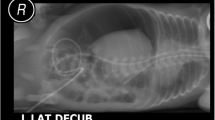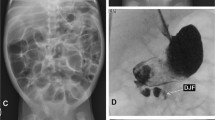Abstract
To determine the potential aetiological factors of small bowel perforation in the premature neonate, we performed a retrospective chart review of those neonates with spontaneous intestinal perforation (SIP) of the small bowel seen in our tertiary paediatric hospital between January 1980 and December 2000. Data were collected on gestational feto-maternal health, medical interventions prior to perforation and the subsequent operative and laboratory findings. There were 23 patients with SIP of the small bowel over the 21-year review; 65% were male. There were 7 twin pregnancies but no cases linked to maternal drug abuse. The median gestational age was 27 weeks, the median birth weight 973 g, 19 neonates required ventilation, 15 steroids and 13 indomethacin. The median age at diagnosis was 7 days, heralded by rapid development of abdominal distension in 22 patients. Surgical intervention in addition to insertion of a peritoneal drain was required in 19 patients. Positive microbiological cultures of blood or peritoneal fluid at operation were documented in 8 patients; 5 grew Staphylococcus epidermidis and 4 Candida species. Perforations were located in the ileum in 20 and the jejunum in 1. Deficiency of the muscularis propria was found in 6 patients. Of the 6 deaths, 2 neonates had significant co-morbidity in addition to extreme prematurity. Small bowel SIP occurs in the premature neonate after the first week of life and usually presents with abdominal distension. Putative risk factors identified included twin gestation, neonatal ventilation, use of steroids and indomethacin, infection with Staphylococcus epidermidis and Candida species and deficiency of enteric smooth muscle.


Similar content being viewed by others
References
Adderson EE, Pappin A, Pavia AT (1998) Spontaneous intestinal perforation in premature infants: a distinct clinical entity associated with systemic candidiasis. J Pediatr Surg 33:1463–1467
Alawadhi A, Chou S, Carpenter B (1989) Segmental agenesis of intestinal muscularis: a case report. J Pediatr Surg 24:1089–1090
Alpan G, Eyal F, Vinograd I et al. (1985) Localized intestinal perforations after enteral administration of indomethacin in premature infants. J Pediatr 106:277–281
Aschner JL, Deluga KS, Metlay LA, Emmens RW, Hendricks-Munoz KD (1988) Spontaneous focal gastrointestinal perforation in very low birth weight infants. J Pediatr 113:364–367
Boikan WS (1930) Meconium peritonitis from spontaneous perforation of the ileum in utero. Arch Pathol 9:1164–1183
Buchheit JQ, Stewart DL (1994) Clinical comparison of localised intestinal perforation and necrotising enterocolitis in neonates. Pediatrics 93:32–36
Cass DL, Brandt ML, Patel DL et al. (2000) Peritoneal drainage as definitive treatment for neonates with isolated intestinal perforation. J Pediatr Surg 35:1531-1536
Giacoia GP, Azubuike K, Taylor JR (1993) Indomethacin and recurrent ileal perforations in a preterm infant. J Perinatol 13:297–299
Gordon P, Rutledge J, Sawin R, Thomas S, Woodrum D (1999) Early postnatal dexamethasone increases the risk of focal small bowel perforation in extremely low birth weight infants. J Perinatol 19:573–577
Grosfeld JL, Molinari F, Chaet M et al. (1996) Gastrointestinal perforation and peritonitis in infants and children: experience with 179 cases over ten years. Surgery 120:650–656
Grunewald B, Allen M, Bouchier D (1997) Infants with isolated intestinal perforation. J Pediatr Surg 32:384
Hall TR, Zaninovic A, Lewin D, Barrett C, Boechat MI (1992) Neonatal intestinal ischaemia with bowel perforation: an in utero complication of maternal cocaine abuse. AJR Am J Roentgenol 158:1303–1304
Harms K, Michalski S, Speer C, Ludtke FE, Lepsien G (1994) Interdisciplinary treatment of necrotizing enterocolitis and spontaneous intestinal perforations in preterm infants. Acta Paediatr Suppl 396:53–57
Harms K, Ludtke FE, Lepsien G, Speer CP (1995) Idiopathic intestinal perforations in premature infants without evidence of necrotizing enterocolitis. Eur J Pediatr Surg 5:30–33
Hermann RE (1965) Perforation of the colon from necrotising colitis in the newborn: report of a survival and a new etiologic concept. Surgery 58:436–441
Huang S-F, Vacanti J, Kozakewich H (1996) Segmental defect of the intestinal musculature of a newborn: evidence of aquired pathogenesis. J Pediatr Surg 31:721–725
Izraeli S, Freud E, Mor C et al. (1992) Neonatal intestinal perforation due to congenital defects in the intestinal muscularis. Eur J Pediatr 151:300–303
Lessin MS, Luks FI, Wesselhoeft CW Jr et al. (1998) Peritoneal drainage as definitive treatment for intestinal perforation in infants with extremely low birth weight (<750 g). J Pediatr Surg 33:370–372
Litwin A, Avidor I, Schujman E et al. (1984) Neonatal intestinal perforation caused by congenital defects of the intestinal musculature. Am J Clin Pathol 81:77–80
Lloyd JR (1969) The etiology of gastrointestinal perforations in the newborn. J Pediatr Surg 4:77–84
Meyer CL, Payne NR, Roback SA (1991) Spontaneous, isolated intestinal perforations in neonates with birth weight less than 1,000 g not associated with necrotizing enterocolitis. J Pediatr Surg 26:714–717
Mintz AC, Applebaum H (1993) Focal gastrointestinal perforations not associated with necrotizing enterocolitis in very low birth weight neonates. J Pediatr Surg 28:857–860
Raghuveer G, Speidel B, Marlow N, Porter H (1996) Focal intestinal perforation in preterm infants is an emerging disease. Acta Paediatr 85:237–239
Resch B, Mayr J, Kuttnig-Haim M et al. (1998) Spontaneous gastrointestinal perforation in very-low-birth-weight infants—a rare complication in a neonatal intensive care unit. Pediatr Surg Int 13:165–167
Rovin JD, Rodgers BM, Burns RC, McGahren ED (1999) The role of peritoneal drainage for intestinal perforation in infants with and without necrotising enterocolitis. J Pediatr Surg 34:143–147
Salter AEH (1930) Congenital rupture of jejunum. Med J Aust 1:422–423
Samaranayake YH, Wu PC, Samaranayake LP, Ho PL (1998) The relative pathogenicity of Candida krusei and C. albicans in the rat oral mucosa. J Med Microbiol 47:1047–1057
Schmidt B, Davis P, Moddemann D et al. (2001) Long-term effects of indomethacin prophylaxis in extremely-low-birth-weight infants. N Engl J Med 344:1966–1972
Shalev J, Frankel Y, Avigad I, Mashiach S (1982) Spontaneous intestinal perforation in utero: ultrasonic diagnostic criteria. Am J Obstet Gynecol 144:855–857
Shorter NA, Liu JY, Mooney DP, Harmon BJ (1999) Indomethacin-associated bowel perforations: a study of possible risk factors. J Pediatr Surg 34:442–444
Smith H, Sinha S (1992) Gastrointestinal complications associated with dexamethasone treatment. Arch Dis Child 67:667
Spadone D, Clark F, James E et al. (1992) Heparin-induced thrombocytopenia in the newborn. J Vasc Surg 15:306–312
Tatekawa Y, Muraji T, Imai Y, Nishijima E, Tsugawa C (1999) The mechanism of focal intestinal perforations in neonates with low birth weight. Pediatr Surg Int 15:549–552
Thelander HE (1939) Perforation of the gastrointestinal tract of the newborn infant. Am J Dis Child 58:371–393
Uceda JE, Laos CA, Kolni HW, Klein AM (1995) Intestinal perforations in infants with a very low birth weight: a disease of increasing survival? J Pediatr Surg 30:1314–1316
Vanhaesebrouck P, Thiery M, Leroy JG et al. (1988) Oligohydramnios, renal insufficiency, and ileal perforation in preterm infants after intrauterine exposure to indomethacin. J Pediatr 113:738–743
Weinberg G, Kleinhaus S, Boley SJ (1989) Idiopathic intestinal perforations in the newborn: an increasingly common entity. J Pediatr Surg 24:1007–1008
Wurtzel D, Nicosia RF, Yoskovitch A, Zubrow AB (1996) Neonatal intestinal perforation caused by intestinal muscularis defect associated with vascular ectasia. J Maternal Fetal Med 5:18–21
Zamir O, Goldberg M, Udassin R et al. (1988) Idiopathic gastrointestinal perforation in the neonate. J Pediatr Surg 23:335–337
Zamir O, Shapira SC, Udassin R et al. (1988) Gastrointestinal perforations in the neonatal period. Am J Perinatol 5:131–133
Author information
Authors and Affiliations
Corresponding author
Rights and permissions
About this article
Cite this article
Holland, A.J.A., Shun, A., Martin, H.C.O. et al. Small bowel perforation in the premature neonate: congenital or acquired?. Ped Surgery Int 19, 489–494 (2003). https://doi.org/10.1007/s00383-003-0967-8
Accepted:
Published:
Issue Date:
DOI: https://doi.org/10.1007/s00383-003-0967-8




